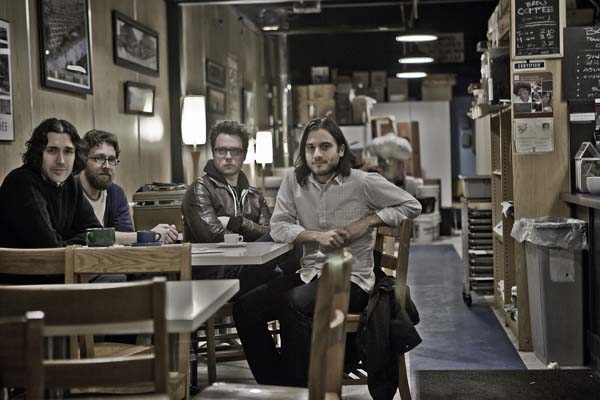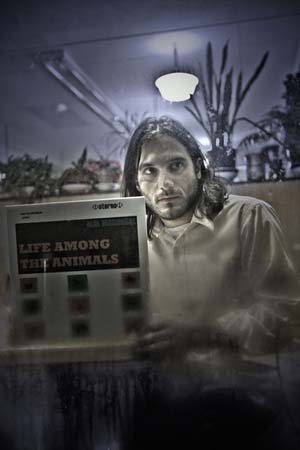|

Mal
Madrigal: Bartolomei's Folly
story by tim
mcmahan
photos by bill
sitzmann
| |
|
Lazy-i: December 20, 2007
|
Mal Madrigal
frontman Steve Bartolomei must seem like a relic in an era when
bands rush to record their latest songs in their digital home
studios, quickly tweak those recordings to a fine sheen using
ProTools before immediately uploading the digital files onto their
MySpace pages for anyone online to hear.
By contrast,
Bartolomei has taken two years to record his debut albums using
old-fashioned analog tape recorders, only to make them available
as two separate vinyl record albums.
Where it's
not uncommon for small punk and indie bands to release singles
on vinyl, it's rare to see someone release two vinyl LPs without
offering the recordings on Compact Disc. Such a move by a modern-day
indie band seems downright insane, especially when most of its
potential audience doesn't even own a record player. Bartolomei
knows this.
"Everyone
in this band wants to make music that sounds the best it can,"
he said. "Vinyl seemed like the natural solution. As for
the commercial considerations, I buy music from my favorite bands
mostly on vinyl. That's the way I like it. I wouldn't spend my
own money making CDs. I don't know if that sounds crass, but since
I'm funding this record, I want to see it finished a certain way."
|
|
|
It
sounded crazy to me too, until Bartolomei dropped off copies of
the Mal Madrigal records -- Life Among the Animals and The
Road Is Glue -- on my front doorstep. While I receive a half-dozen
CDs in the mail every week, I never get records. There is something
special about pulling that slice of 180-gram vinyl from the record
sleeve, placing it on my Technics turntable and dropping the stylus
on the groove. Unlike CDs, there is a sense of permanence to vinyl,
as if you're playing a document that will outlive you. Though I
can't hear any real differences in sound quality on my inferior
stereo beyond the occasional crackle of dust on the needle, I know
records sound better. I can feel it. That alone makes vinyl a better
investment than a CD. Suddenly, Bartolomei's folly made perfect
sense.
His records
are certainly worth the investment in a turntable. Life Among
the Animals is the moodier of the two, mixing layers of textured
guitar effects beneath Bartolomei's introspective folk ballads lovingly
performed by musicians that include guitarist Mike Saklar, vibraphone/keyboardist
Ben Brodin, drummer Eric Ernst and bassist Ryan Fox (Chris Esterbrooks
handles bass for live performances). It opens with the acoustic
love song "Close to Me" that's introduced with a sample
taken from a 78-speed record of Irving Berlin's "When I Lost
You," sung by Bartolomei's grandfather, Frank Pane -- one era
of vinyl reproduced in another. The record ends with Bartolomei
lamenting "The world is not my home," followed
by a noise collage that sounds like he's trying to conjure the ghosts
of music's past.
The Road
is Glue, on the other hand, is more of a Bartolomei song book,
a collection that includes rerecordings of three songs from his
unreleased 2004 CD. Bartolomei never considered releasing the two
records as one double album. "I hear them differently,"
he said. "I didn't want to do them as a pair. Double CDs or
LPs ask a lot from a listener. I wanted specific liner notes and
art work for each. That's the beauty of doing it yourself; you don't
have to answer to anybody."
|

|
"
I wouldn't spend my own money making CDs. I don't know if
that sounds crass, but since I'm funding this record, I want
to see it finished a certain way."
| |
|
|
|
"When
I press 'record' on my tape machine, it records almost every
time, and when it doesn't, I just need to dust off or jiggle
something."
|
|
|
The
analog concept was core throughout the entire project. The tracks
were recorded at a studio in D Rocks, a music store where Bartolomei
and Saklar teach guitar. "We recorded this the way records
used to be recorded," Bartolomei said. "We all set up
in the same room. We played at the same time looking at each other.
No one wore headphones. There were no digital manipulations; nothing
was auto-tuned, the drumbeat wasn't synchronized to a clock. We
recorded to 1/2-inch analog tape on an 8-track machine."
The limitations
of having only eight tracks prevented the project from being completely
analog. Eventually everything was dumped into ProTool. "Analog
recording isn't perfect," Bartolomei said, "but it's simple
and reliable. When I press 'record' on my tape machine, it records
almost every time, and when it doesn't, I just need to dust off
or jiggle something."
The analog process
ultimately came down to engineer Bob Weston at Chicago Mastering
Services painstakingly cutting the vinyl masters by hand. "It's
an art form," Bartolomei said.
From recording
to tape to vinyl mastering to pressing the final product, the entire
process was much more expensive than merely burning CDs. Bartolomei
said he pressed 500 of each album and is hand screen-printing 150
of each album sleeve. The records will be sold for $15 each or both
for $25 during Saturday night's release show. Each also will include
a CDR so listeners can download the albums onto their computers
and iPods.
With plans to
reenter the studio this summer, will Bartolomei go "all vinyl"
again? "It depends on the finances," he said. "I
never expected to make money or break even releasing records. This
is an historical document of what we did at this at this time in
our lives. For me, it's worth it."
Back to 
Published in The Omaha Reader Dec. 20, 2007.
Copyright © 2007 Tim McMahan. All rights reserved. Photos by
Bill Sitzmann, copyright
©
2006. Used by permission.
|
|
|
